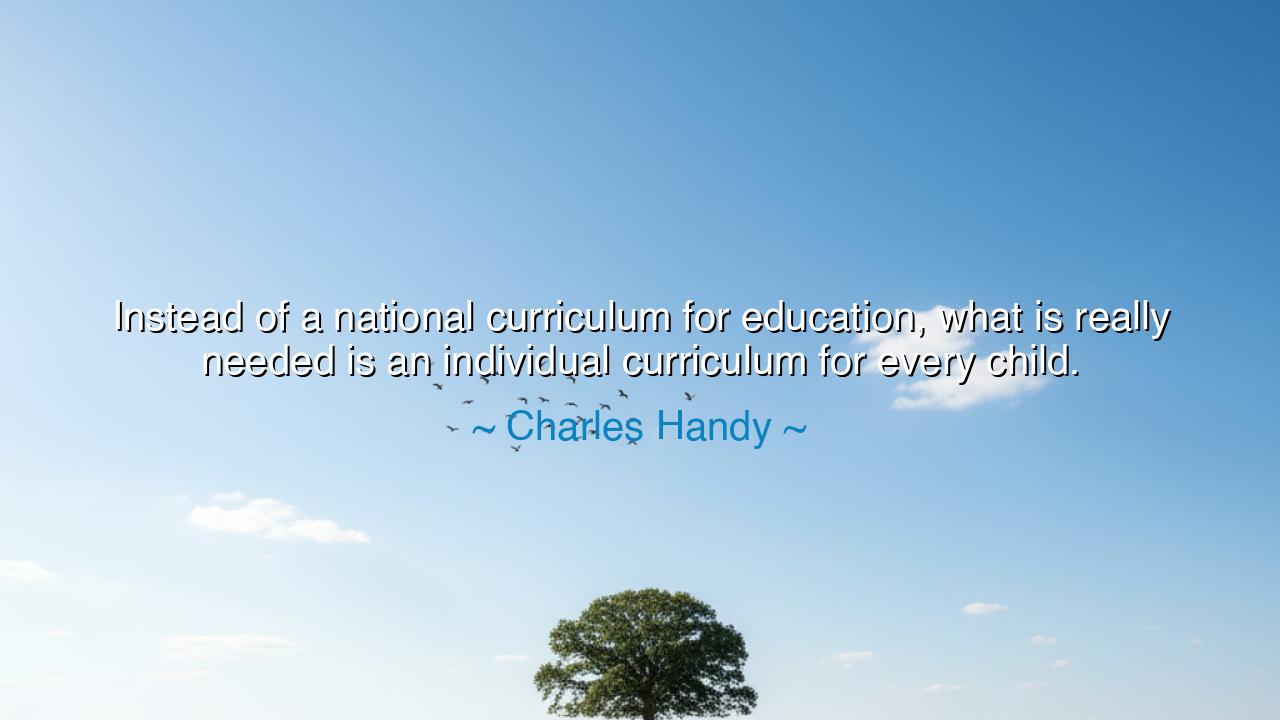
Instead of a national curriculum for education, what is really
Instead of a national curriculum for education, what is really needed is an individual curriculum for every child.






Hear the words of Charles Handy, philosopher of work and society, who declared: “Instead of a national curriculum for education, what is really needed is an individual curriculum for every child.” In this saying lies a truth both tender and profound. For Handy saw that no two souls are alike, no two minds shaped the same, no two hearts moved by the same fire. To bind all children to one rigid measure is to deny their uniqueness; to honor each with a path of their own is to let them flourish like varied flowers in a great garden of humanity.
The ancients, too, recognized this. Plato spoke of educating according to the nature of the soul, guiding each one toward the virtue that best suited their spirit. He saw that the soldier, the philosopher, the craftsman, and the ruler must each be trained differently, for their gifts and destinies were not the same. Handy’s words echo this ancient wisdom, reminding us that the goal of education is not uniformity but the awakening of individual greatness.
Think of the story of Albert Einstein. As a boy, he was considered slow by his teachers, ill-suited to the rigid schooling of his day. Yet his individual curriculum—his insatiable curiosity, his private explorations into mathematics and physics—nurtured the genius that would one day rewrite our understanding of the universe. Had he been chained only to a national curriculum, his brilliance might have been extinguished before it ever shone. His life proves Handy’s vision: that every child needs an education shaped to their gifts, not to the demands of conformity.
And consider Helen Keller, both blind and deaf from early childhood. The national curriculum of her time could not have reached her. Yet through the devotion of her teacher, Anne Sullivan, she was given an individual curriculum, tailored to her unique needs. She learned not only to communicate but to think, to write, to inspire millions. Her story is a living testament that when education bends to the individual, even the most difficult barriers can be overcome, and a soul can reach its full height.
Handy’s words also carry a warning: when nations exalt a single curriculum, they risk creating citizens who think alike, act alike, and dream alike. But a society of sameness is weak, for its imagination is narrow. True strength comes from diversity of thought, from the many voices of many minds, each contributing their unique vision. An individual curriculum for every child does not mean chaos—it means nurturing variety, so that society itself becomes richer, more resilient, more creative.
The lesson for us is clear: let us not force every child into the same mold, but instead seek to understand their gifts. Teachers must be gardeners, tending each plant according to its needs. Parents must recognize the uniqueness of their children, guiding them not into their own image but into the fullness of who they are. And students must be encouraged to see their difference not as weakness but as strength, a sign that their path is their own.
Practical action is demanded: build schools where flexibility reigns, where curiosity is honored, and where teachers are given the freedom to adapt learning to each student. Encourage mentorships, apprenticeships, and creative exploration. Provide not only textbooks, but opportunities for each child to discover their talent—be it in art, in science, in service, in invention, or in leadership.
So let Charles Handy’s words be remembered: “What is really needed is an individual curriculum for every child.” For the purpose of education is not to create identical citizens, but to awaken the infinite variety of human potential. If we do this, the world will be richer for it, as each soul contributes not a copy, but a masterpiece. And in such a world, no gift will be wasted, and no child will be left unseen.






AAdministratorAdministrator
Welcome, honored guests. Please leave a comment, we will respond soon